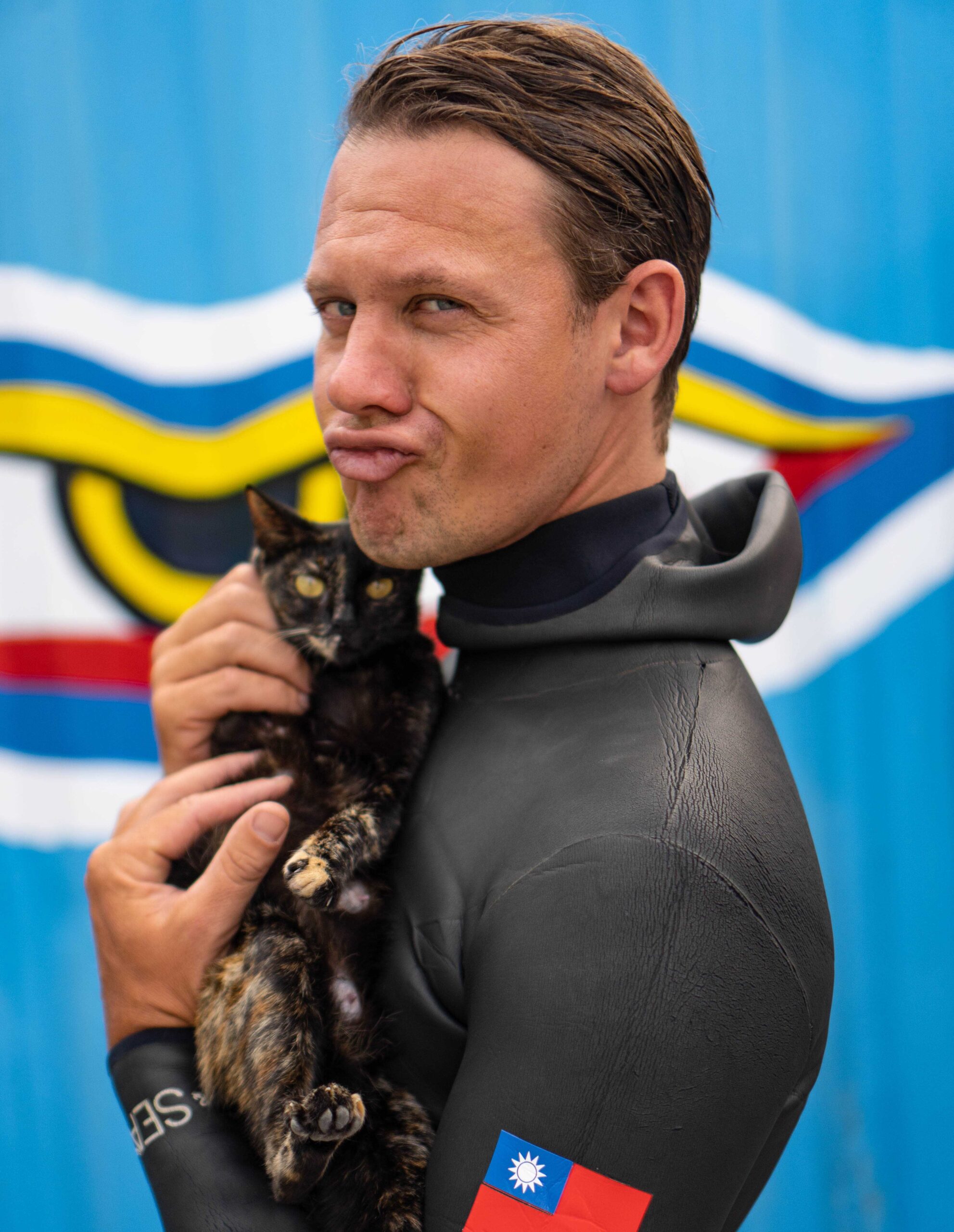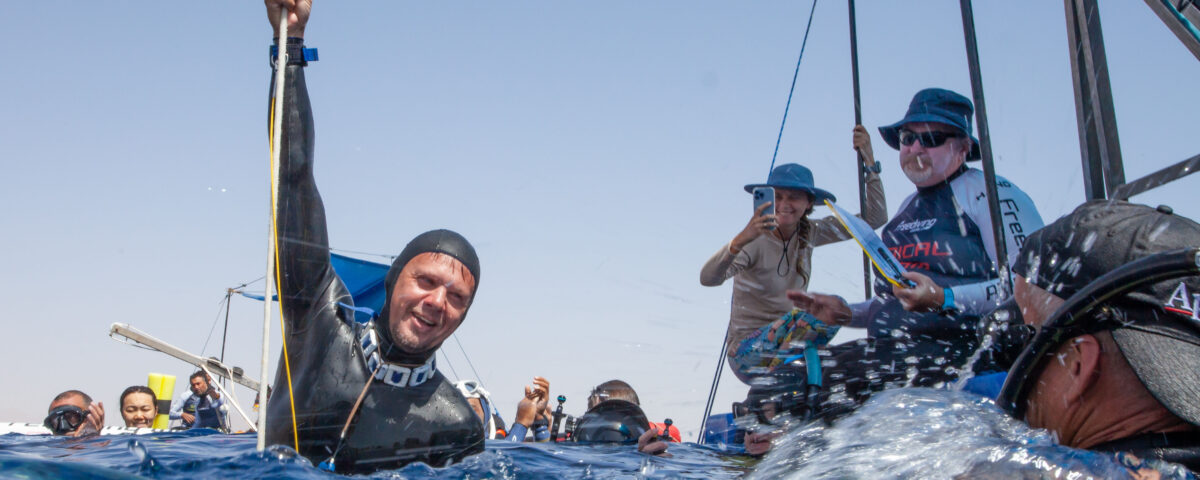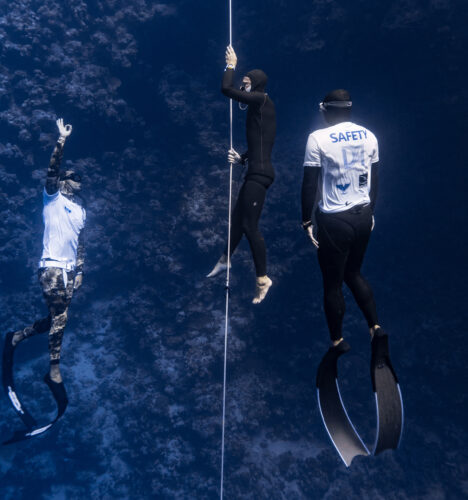Donny Mac and His The Freedive Café
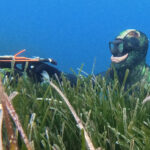
H. Dessault: Merou Camu Wetsuit
15 April 2025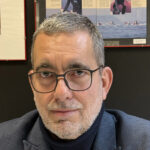
Romano Pigozzi Appointed New President of Assosub
9 May 2025If I say “Donny Mac,” not everyone will immediately know who I’m talking about. But if I mention The Freedive Café, I’m quite sure many ears will perk up. Yes, because the most famous freediving podcast of all time hasn’t just caught the attention of many champions eager to be interviewed, but it’s also increasingly followed by newcomers and the simply curious—people seeking gems of insight and pearls of wisdom that this format delivers interview after interview, episode after episode. So here’s Donny: a freediver, creator of “slow” content, certainly not a fan of social media, but without a doubt a producer of incredibly valuable episodes for the entire freediving community
Filippo Carletti
Hi Donny! First off, how did your passion for freediving begin?
"It’s a passion I discovered at a very young age! I was 12 when I saw Luc Besson’s The Big Blue (Le Grand Bleu) for the first time. I instantly fell in love with it—just like so many others who later decided to dive into this world. My father had the film on VHS, and I’d watch it from time to time, dreaming of those adventures and the ocean! Funny thing is, I was never really into swimming. At 20, I was living in Amsterdam, working in a bar and restaurant, living a lifestyle completely different from now—and very far from the sea. But deep down, I always knew that sooner or later I’d try freediving. I had this strong desire to follow in the footsteps of those movie characters who disappeared beneath the ocean’s surface on vertical journeys.
Eventually, about nine years ago, in 2016, I tried returning to Europe from Taiwan, but a series of fortunate events led me instead to Indonesia. There, I found the perfect conditions to try freediving. I had the great honor of meeting Michael Board, who at the time ran one of the most well-known schools in the world. I got hooked, dreamed of opening my own school, kept studying and training, and after taking an instructor course, this is now my job—and has been for the past seven years."
Practicing a sport is one thing, but becoming a communicator is another. How did the idea of the podcast come about?
"The idea came before I even became an instructor—or even finished my first freediving course, actually. I’ve always been a huge fan of podcasts and slower media formats compared to social platforms like Instagram. My favorite show has always been The Rich Roll Podcast, and listening to it made me think how amazing and helpful it would be to have a similar format fully focused on freediving.
Starting a podcast has many advantages: it doesn’t need high production quality, no video is required, and the equipment is minimal. What really matters is the quality of the guests. At first, I didn’t know much about the freediving world, or even who to invite. So I just started emailing everyone I thought might be interesting. To my surprise, everyone responded with interest. Each person was eager to share their story and knowledge.
I started with the athlete list from that year’s Vertical Blue competition. And as for the structure, I shamelessly copied Rich Roll’s format, which I’ve always loved."
Today, your podcast boasts over 160 episodes. So many international athletes have appeared—Trubridge, Pelizzari, Molchanov, and many others. Who stands out most for you?
"There are so many, and it’s hard to choose—I’m bound to forget someone important. But for sure, I have to mention Aharon Solomons. He’s a unique freediver, often a nonconformist, with an incredibly vast knowledge. At the time, he was one of the few posting educational videos on YouTube—not just instructional, but also focused on discussion and reflection. He has rare insights, unique perspectives, and a deeply respectful approach to the sport.
Another one is Guillaume Néry. A special freediver and athlete for so many reasons. I really admire his philosophy, his personality, and how he approaches the discipline. It took a long time to organize that interview, so I definitely worked hard for that one!
Then there's Trubridge, especially the second interview we did. And Martin Stepanek, too! Honestly, there are just too many episodes I hold dear. One name I have to mention is Sayuri Kinoshita, the Japanese athlete who tragically passed away in 2019—a huge loss for our community."
These episodes are incredibly useful and inspiring for many. Was that your intention from the start?
"At the heart of it all is a huge passion—so yes, I’d say that was the intention. The information in the interviews is vast and, in my opinion, incredibly valuable. Imagine getting to exchange ideas daily with people who not only witnessed the sport evolve but were active agents of that change. Talking to Carrera, Trubridge, Molchanov, Néry, Lozano—hearing their views on training, depth, and the philosophy of this sport. It’s like a journey of learning. Meeting so many champions has shaped my own freediving philosophy.
Freediving, especially deep diving, has its own spirituality. It’s not just about reaching a depth. It’s a journey—a spiritual one, even—through which freedivers can discover who they are and what they’re capable of.
Try telling someone about Trubridge’s 102 meters in CNF (constant no fins). Look at their face! The truth is, to reach those depths, you need preparation, experience, and knowledge. In modern freediving, maybe we’ve lost a bit of that magic and spirituality. These days, more athletes than true freedivers are going deep just to add meters. But that just shows how the sport is still evolving. Not everyone, of course! As Néry said to me, there are two fundamental principles to going deep: you need time to feel good while descending, and you need a profound ability to relax.
I know 'relax' is an overused word today, but that’s because it’s absolutely essential. There are many meanings and levels to relaxation—but only a freediver knows how powerful conscious relaxation can be.
No other sport in the world is like this. To go into the depths on a single breath, you have to be silent—both in your body and in your mind. You have to surrender. Descent and ascent are two different journeys. Going down is like deep meditation. Coming back up is like climbing a mountain. It’s emotional watching champions surface from over 100 meters."
Do these champions share any common traits?
"I’ve asked many of them. There’s definitely a difference—especially between past and present. In the past, freediving was more of a spiritual practice. It wasn’t about counting meters, but about what you could find within yourself. Today, the competitive side dominates. People want medals. They want results. I think the real divide lies between what freediving used to be and what it is now.
What I do know for sure: freediving has nothing to do with swimming. I was never a good swimmer—at least not until the instructor course. I could dive 50 meters deep but couldn’t replicate that horizontally!"
Did you expect your podcast to gain so much interest?
"Honestly, no. First and foremost, I started it for myself. But thinking about it—considering it’s a podcast about freediving—when I look at the download numbers, which are between 5,000 and 10,000 per month, I’m still pretty amazed. I’ve definitely been surprised by how many people are interested.
The release schedule has slowed over the last two years. I moved to Dahab and started competing. Work has made it hard to keep up with the podcast. But the core idea remains strong: to finish it. This project is closely tied to my personal journey through freediving. Maybe the last episode will be someone interviewing me!
I’d also love to add new formats—beyond interviews. Maybe covering single topics like dry training, equalization, technique, and more."
And at the end of this journey, what would you like to be able to say?
"In episode 100, I explained that for many years I had no goals tied to depth. Later, I thought I’d like to reach 100 meters. That was in 2020, then COVID hit and the world went crazy. But now, I’ll say it again: I want to reach 100 meters and share with other freedivers how I got there.
I don’t see it as an impossible dream. If I stay disciplined and focused, I truly believe I can do it. As of now, I’ve hit 83 meters. I’ve got some good knowledge and decent skills. I want to try!"
Besides being a great freediver, you’ve proven to be a fantastic communicator. Which of the two roles feels more like your true self?
"Definitely the freediver. I hate social media. I love podcasts because they’re old-school. I force myself to stay on Instagram, but not because I want to be famous. My goal as a communicator is to provide people with high-quality information. Otherwise, I’d feel like I was wasting my time—and theirs.
That said, if I ever got rich, I know exactly what I’d do. I’d disappear completely and just go freediving every day! Many people support me on Patreon, and I really appreciate it, even though I don’t promote it much."
Tell us about your school!
"I’m an instructor, and i run a school in Dahab called True Depth Freediving. It’s right by the sea, and students and clients often come for both courses and training. I also do in-person and remote coaching. Soon, I’ll be organizing my first retreat, which will include yoga, meditation, and all the tools I’ve used in my life to become a better freediver.
Another future project I’d love to do is organizing the wealth of information from all the podcast episodes into categories—putting together themed editions with specific focuses.
And don’t miss the episode with Umberto Pelizzari—it’s amazing!"
So, Donny truly is a 360-degree freediver—maybe even more!
If you're looking for him, you’ll find him on Instagram (even if he doesn’t love it) at @truedepthfreediving, or on his official website: truedepthfreediving.com, where you can also find all episodes of the podcast.
